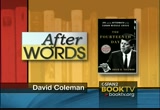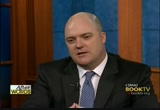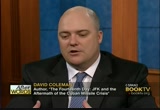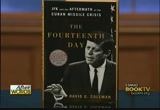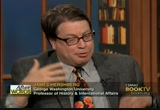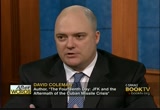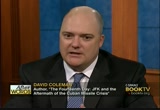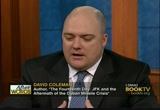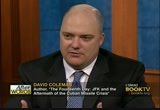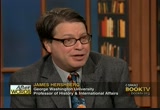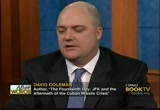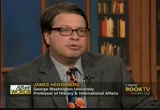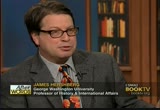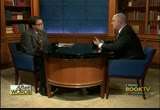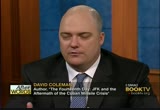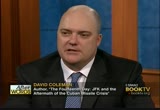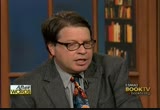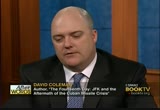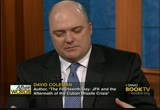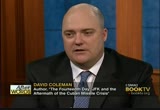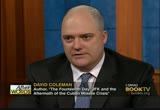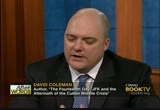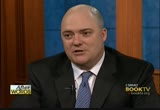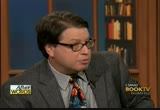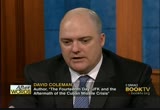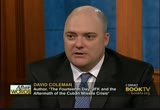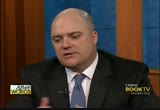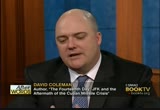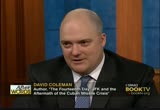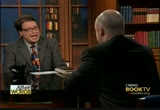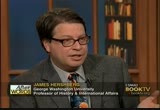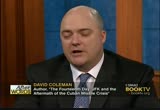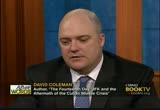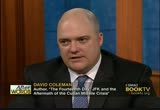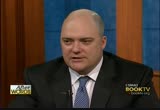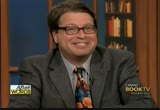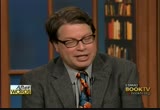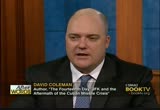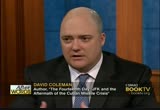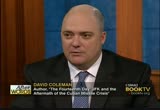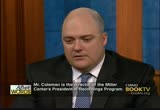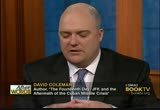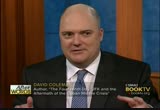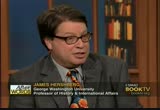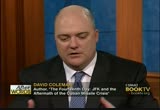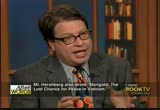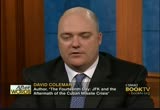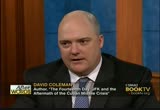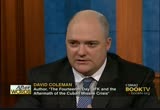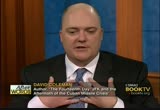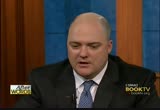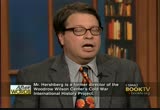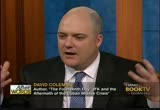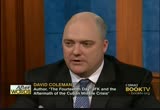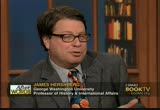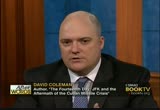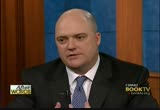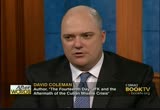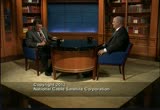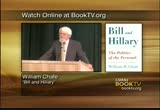tv Book TV After Words CSPAN November 22, 2012 1:00pm-2:00pm EST
1:00 pm
hershberg of the wilson center's cold war international history project. this week, david coleman in his latest book, "the fourteenth day: jfk and the aftermath of the cuban missile crisis." .. was called but decide to focus on the aftermath than the crisis. >> guest: there's two things i wanted to talk about. two different tracks that end up
1:01 pm
dove tailing. most of the book cover the cuban missile crisis on the 13th day and he decided to back down. he agreed to withdrawal the missiles from cuba. the first question i had was now what? what happened. and interestingly, this is back to what happened. we know what happened in the weeks and months after that from the russian and cuban sources than we do from the american side. there hasn't been a lot of study on the american side about what happened. i would happen to work with the kennedy tapes. he was taping during the period. i had a remarkable window. i wanted to extend the story of the missile crisis to find out what happened then. because on the 13th day when he capitulated there was a missiles in cuba. there were tens and thousands of
1:02 pm
soviets in cuba. >> host: they didn't know about. >> guest: we'll discuss it later. the point being that the crew he lied -- they had lied. there was a deep skepticism among them. it was perhaps a trick. perhaps the crisis wasn't over. perhaps it was going it get worse. it was one thing i wanted to deepen the story of the missile crisis. the second thing, it's a remarkable neared kennedy's presidency. it's a private point where he can turn the presidency around. it f do you any polls today on the greatest president since world war ii kennedy ranks number one. one of the reason is the handling of the cuban missile crisis. and so i wanted to look at the period kennedy took a presidency that wasn't going as well as he hope and able to turn things around and establish a leg spie
1:03 pm
-- legacy the few months. the two things dove tailed. what we understand about the cuban missile crisis. it was a proud moment for american history, i would argue is not inevitable. if grow back to november, december, or january of 1963, it was touch and go whether or not it was going to do down as a ken i did victory or failure. because kennedy's political opponent were trying to paint it as a failure. i think the battle is going on with kennedy trying to shape the presidency, define the presidency, and shape his legacy is going on at the same time but also how we understand the missile crisis today. >> host: one of the army of history moved forward and written backwards. looking backwards, of course, it would be under the shadow of his assassination a year later. i remember one of the first books about the missile crisis. the cover was em blaze end the
1:04 pm
finest hour. many them it -- it was a complicatedded and dicey situation when it seemingly ended. there were a lot of issues left on the table. your book deals with this question of trust in a way of ronald reagan, which -- but verify. and on the same day he agreed to remove the missile castro refused to allow the inspection of any missile dis-- ties mantling what was some of the things kennedy had to deal with beginning on the 29th of the issue of the inspection and the soviet weapons and forces left over in cuba. >> guest: i think the context is important to remember. on october 18th two days after he had been shown photographs of the missiles in cuba. the prime minister came to the oval office, kennedy asked him flat out are you installing
1:05 pm
nuclear cuba. and he said no, we're not doing 0 this. kennedy had the photographs. and kennedy this is instructed. he's been lied to directly about the missile. fast forward about two weeks. you have the issue with the soviet prime minister said we will remove the missiles. we will do it. for the -- it was not so much trust to verify that was verified first. there wasn't a lot of trust. kennedy was talking about how the soviet ambassador to the united states was not burned as a source. we can't believe him. not because necessarily he was lying. there were concerns that he minute told about this. there were concerns about listening to any of the soviet diplomats. the things about diplomats abroad to lie for the country. that's what they were doing. they have the promise, but they really -- it's they really have to follow through and work out
1:06 pm
how to verify first. he talk about how there might be a massive trick. if it might be a hoax which history has no -- what they have to do is work at how they can do it. what that involves is american eyes seeing what is happening on the ground. the preference is to send american weapon inspection to cuba. castro is not going to allow it. the next best thing is sending american planes over. that in itself is a complicated decision because a surveillance plan had been shot down on october 27. castro was threatening to shoot down the planes. they were coming back with bullet holes. they were encountering the aircraft fire after the days. for kennedy, this is a decision, do i send americans in to harm's way. they had to decide it every day they go to the decision whether or not it's required to send them over today. and the verification in the
1:07 pm
period is about sending american planes over. that has the risks because what do dow if an american plane is shot down. there is actually a remarkable -- this is question talk a little bit later about the value of the tapes there was a remarkable moment on there that the tapes that doesn't show up any any other document. the date is november 5th, the day before the midterm election. robert kennedy is meeting in his office with the soviet ambassador. they are frying to work out the deals. privately about this. word has come to kennedy in the oval office that an american plane, the pentagon told him that the american surveillance plane may have been shot down over cuba. kennedy has the tape recorder rolling and talking to robbie kennedy while the prime minister is -- ambassador is the room. we think a plane has been shut down. what do we do? and he's going through do we do air strikes? he's talking about the things about the prelim performs going
1:08 pm
to be faced when it comes out. it's one of the remarkable moments you get to hear a.in real time struggling through, okay, now what go do? do we retaliate and send our planes over and knock out the airfield which would have reinflamed the crisis. kennedy was having a reprieve. it was a false alarm. they had scrammed. they hadn't shut down an american plane. you goat windows and you get a sense of the tension what kennedy is facing. had is, you know, a week after the 30 the days. you get a sense how close military action was during the period. >> one thing that comes clear through the years. kennedy was acutely fearful of escalation and how future generations would look if they had lost control of the situation as it happened in 19 -- except with the nuclear weapons and on the 27th the plan had tbon shoot down the air
1:09 pm
and missile site. kennedy refused to authorize it. one consideration your book brings out, i think in a very interesting way it wasn't just a question whether or not to send planes. it what kind of plane napes were the high level planes what were safer and less vulnerable to being shot at least by the cubans because they've much going playing along. they were, you know, were not shooting their service air missile. but to get good quality photograph you had to send low level. they were vulnerable to the cubans. >> guest: that's right. i think it's worth explaining why they were under control of two different systems. want soviet surface air system was sophisticated. it required about six months of training for anyone to operate it. during the crisis and after, it was operated by soviet personnel. the lower level one, the standard aircraft were control bid the cubans. and they had two different leaders telling them essentially two different sets of instructions. the american consider the
1:10 pm
society yefs more reasonable in this and they choose not to shoot down the plane more than they trust the cubans >> host: that brings up a fascinating issue which brings out the focus of the research. the october crisis fifty years ago this month. there was a secret sowf jet crisis in november of 1962, the title of new book, one of several for the anniversary by the son. about how castro is absolutely mad at the soviet climb down. did the american suspect have -- in fact one of intense arguments that he speaking for crew nikita the castro's insistence. firing on those american at this point where as the soviets, you are right, were ready to play along with bringing the crisis to a resolution. the americans suspect how bitter
1:11 pm
the divide was becoming? >> caller: yeah. the americans did not have detailed information about happening in the dugses. they did not have someone on the inside. but the cubans were doing a terrible job of hide how unhappy they were with the soviets. what you get is in the intelligence briefings that they president and they would get every day there would be updates how annoyeded what the latest announce is with the castro with nikita. and they had a sense of it. even if they didn't know the intimate details. >> host: did that help to build any renewed frust in crew khrushchev can be trusted. he has the own interest in resolving the crisis. it was the lingering sense can he pull a fast one. it wasn't a u.s. official. in congress and american politics there were those on the right-wing who were saying, you know, this is our chance to get rid of this regime. how do we know they won't hide
1:12 pm
missiles in caves or something like that? so -- how did kennedy view khrushchev once he agreed to pull the miss thes out? did he begin to change the view with him someone >> guest: i'm not sure. i think it took awhile. we were talking before about verifying before trusting. trusting came gradually, again, once the surveillance flights were showing the soviets were following through. they were dismantling things. they started to realize, the sowf soviets and crew shove we can trust him. later on in the weeks later there are moments where trust really comes again. because the months we get -- once we get through the -- the end bookend of the missile crisis is traditionally the november 20th deal. >> host: the war teen ends. >> guest: the nature of the deal there are long-range
1:13 pm
bombers in cuba. there are three weeks of negotiation about are these or not something that we have to get rid ff? and eventually khrushchev decides okay, we'll get rid of them. he tells the americans they'll get rid of them. it's the issue of opportunity hadn't followed through yet. we'll get riffed them within thirty days. that moment kennedy does trust khrushchev against. he lists the quarantine with a promise. in weeks following once they realize the soviets are following through. the soviets are kind of sort of -- for lack of a better word, the responsible parties in this. frankly, they did not view the cubans as particularly responsible or stable. and so once they realize the crew shaf was the one playing ball, then they trusted him more they trusted him on the promise to remove the isle 28 and the
1:14 pm
combat view course. he didn't in the end or most of them. so the element of trust did actually build again. >> host: as we discuss later, you know, many have seen this as a day -- that the entire cold war it could have been a moment when the united states and soviet union move toward better either ending or moderating and yet was cut off by the assassination and the khrushchev disaster a year after that. what they're saying it's not something that happened overnight when the crisis end. it was a gradual process. it was not an immediate sense it's a guy i can do business with and we can start resolving problems all over the place. glrg right. -- >> guest: right. i think it took a -- the americans kennedy felt lied to. justifiably. and i think that's right. it was a slow process to game trust. by the summer of '63 things have
1:15 pm
taken a step toward that. i did is calling for the american university speech in june 10, he's talking about world peace which sounds questioner in rick. crew shove said it was the best speech by an american president. you have the sort of coming together of trying to work through the difficult programs. because at the experience how close things came. >> host: you mention the bombers with the long-range bombers. it brings up another what they had to wrestle with in the days after the agreement withdrawal missiles. khrushchev had a loophole we agree. which you describe as offensive. kennedy meant that the advisers could try to negotiate for the soviets do more than the missile and the il28 bombers. became a major point of contention. one thing your book brings out,
1:16 pm
it's not entirely clear whether the preimminent consideration was military security or national security or whether domestic politics, public opinion began to enter to the consideration of kennedy and his advisers. how would you analyze that aspect of the issue of trying to resolve the crises and what kind of real sticking point not between the american and soviet. the american and soviets. castro was told that they could stay and had to be dealt another blow they the soviets would take them too. >> guest: it comes down to how president kennedy went about the business of being president. how he made the decision. there was no no rule for any particular decision for him. there was no particular docket rain he was defined to -- confined to. it wasn't a matter of deciding that one was type of weapon satisfied military security requirements or violated them or whatever. it is more looking at particular
1:17 pm
issue on the merits. and the way i think think about is contrasts. one the il28. so there is the discussion going on khrushchev we'll remove them. kennedy fry to work out what defensive mean. what is it we can't live with and can live with in cuba? the american doctrine has different idea. the soviet doctrine, we goat the details there, but there's a struggle to prove what the understanding is. the long range bombers to the americans, these had about 750 mile range. they could hate lot of the southeast sides. they were very old. they were obsolete. they weren't much match for the american anti-- the american offense system in the southeastern united states. but the problem was -- and let's
1:18 pm
backtrack. kennedy himself did not think these were particularly a big problem. and actually it comes through on the tapes as the one who is least worried about the il27. he's on tape a few things saying we don't want it get hung on these. i thought we were being a bit unreasonable trying to get them out. he's trying to put himself in crew shove's position. we have to get them out. even ia military threat in the clin cap sense. to the american public, they are not going to be allowed to stay. we can't live with the american public if we let them stay there. george bundy argues for getting rid of them. and kennedy is persuaded that okay if you're not looking at clinical military assessment of what is or isn't a threat we
1:19 pm
have to get rid of them. you look at the other weapons system. it wasn't about the long range missile. there was a lot of other military equipment. >> host: and the tens and thousand of troops. >> guest: the troops were something here. they thought around 7 or 8,000 troops. assessment vary. they change through the crisis. it started at 8,000 and went up. it was 17,000 they were around about 41,000. they never understood how many there. on the 23rd of october, the day after speech to the nation, they started sending low-level surveillance planes. they started getting more details what was on the ground in cuba. they discovered there were in fact these combat troops in cuba. it was the first time i had had been discovered. they were organized to four groups. they had sophisticated personnel carrier weapons. sophisticated canyon they had nuclear capable rockets and so
1:20 pm
what they are trying to decide in the weeks after the 30 day is okay -- the first priority is getting out the il-28. we have to figure out do we want to insist on getting the other weapons and troops out? do we need to go to the map to force khrushchev to pull them out? the division there is different. it drags on. it's a lower priertdty. one of the reasons -- the weapon and troops cannot reach american soil. they are a throat throat threat to guantanamo. they can deal bloody hell with grant moe. guantanamo. >> host: the u.s. navel base. >> guest: right. open the island of cuba. they couldn't reach the united states its. they were not considered a
1:21 pm
threat. they dropped off the top tier, and they -- by the end of november, even after the november 20th deal by november 29th kennedy is saying, look, crew shove said he will probably remove these in due course. that's the phrase he used. but he has no incentive to do that anymore. we don't have any leverage and the only leverage question offer is no-innovation guarantee. i don't want to pay that price. that's too high of a price. maybe we'll have to live with it. what happened, the soviets of their own for the own argument with the cubans ended up deciding to pull out the tactical nuclear weapons. the americans did not force that. the americans did not force them to pull out the combat troops. they kept raising it through. kennedy is talking about them in the weeks before the assassination. but they ended up staying or at least a group ended up staying. they were -- when jimmy carter
1:22 pm
is scsh -- >> host: in the summer of 1979. >> it dates back to the decision in november of 1962 that we're not going make these a top-tier piratety of forcing them out. >> host: a question of the mind set in assessing these weapons of offensive some of the force thatters were some who said to kennedy and around the table that, you know, these could be a threat to the hemisphere. cuban subversion. it could aid it. the big fear was that not so much that cuban was a threat it could be spread oaring countries and brazil was feared might become a second cuba. kennedy and the advisers tell me in the tape you study so carefully in the aftermath. i should mention that david is going to be publishing and has been editing volumes of the
1:23 pm
transcripts. we'll come back to later this never accepted khrushchev's public rationale to detur the bay of pigs. and so they always -- is it fair to say the view never shifted. even some of were aware of the covert operations against castro and intended to overthrow castro. >> guest: let me get the first part of the question. it's interesting. there's ans a enact come through in recent years. first of all, timothy, more recently [inaudible] brought out is that we have been talking about the frogs and the lunars. -- >> host: the tactd call weapons. >> guest: right. the short-range battle field weapons. they have a nuclear warhead. they sent some around about 98
1:24 pm
or so to cuba. the plan was to hand at least some of these over to the cuba. which would have made them a nuclear power. when you talk about the fear of subversion there was an aspect they didn't understand. props cuba might in fact get nuclear weapons. and this is only something we have learned more recently. it if castro is inclined to share weapons or share resources with revolution their latin america. he came close to having the type of weapon. it would have gotten out of control. the americans didn't know this. kennedy fought the idea of soviets handing nuclear weapons noft possible. it was absurd. he didn't think that. e had no idea that was the plan. so that aspect and the subversion, i think, much more dangerous than i think they thought at the time. because they didn't realize the
1:25 pm
aspect of the cubans might in fact have the nuclear weapons. >> host: going back to the bombers some of them did have the nuclear payload. >> guest: right. there are military assumptions that go on. >> host: tell me if they understood the dynamic that come out on the research of the soviet union tensions in november which is in order sort of rescue, sal salvage at alliance knowing castro was fourous. they were eager to assure him the commitment to protecting cuba economisted and they were desperate to keep the -- under cuban control. leave a trip wire. that would risk, you know, receive yet involvement. did the americans understand the alliance was in jeopardy? >> guest: it i thinks comes
1:26 pm
back to the second part of the previous question. why did crew shove do this? half a century later historians are arguing about why crew shove did it. he said a few different things why he did it and it shifted over time. he settled on the idea was to defend cuba. but if you go back to the period of a time and you look at what kennedy was thinking, this was not really his what he thought crew shove was up to. kennedy was looking at more global game. he didn't think that, you know, khrushchev why would you send long range nuclear missiles to cuba to protect them. it didn't make a lot of sense. kennedy trying to think through why is he doing this? the idea of defending cuba doesn't comes up. doesn't know he is planning a full innovation. there are other coverted things going on. full innovation probably isn't
1:27 pm
what he's going do. he doesn't jump to the defense of cuba. what he jumps to is global and he looks half way around the world to where he feels most vulnerable to west berlin. khrushchev has been trying to force the berlin and it dates back to the stay lynn trying to push the west out. it's a festering cold war flash point. kennedy feels vulnerable as eisenhower and true march. kennedy thinks it's about west berlin. perhaps crew khrushchev is trying to leverage something. he wasn't without some evidence crew sheaf had been givings him evidence. he kept talking to american visitors and west german visitors who visited moscow. he kept bringing up berlin. we're going to bring it up in
1:28 pm
november at the united nations after the midterm election. he been broadcasting this through the summer. kennedy had been reading about this and reading the reports. they conditioned going to the crisis to believe that crew sheaf is going to force the issue. that's the issue that kennedy keeps coming back to cuba. if you ask kennedy what is crew sheaf up to. and kennedy was talking about this. kennedy would say west berlin. he would not say defense of cuba. the defense of cuba angle doesn't come through a lot for the american. not really thinking this through. it doesn't make sense to them. it doesn't sound like the way you defend cuba. the way from the american perspective in 1962 to do a mutual treaty or send lots of cop vengessal weapons which is what they were doing. but not send long range missile to threaten the united states. it's funny khrushchev accept the
1:29 pm
tactical battle field weapon. i think kennedy would have had a harder time convincing the world they were offensive weapon. >> guest: exactly. the flip side of that is that that kind of deterrence angle only work it you announce it. what good is the doomsday machine if you don't tell the word. >> host: exactly. >> guest: so at the mount that the crisis broke, everything about this was still secret. who knows what khrushchev would have done. how he would have gotten the united nations and said this is done. we are going to -- here but deterrence only works if the other person knows about it. and at that point, the americans had not been told about the missile or the short range or the long range. >> host: the global aspect they presumed was behind the decision was the nuclear balance. a year before the u.s. had revealed that u.s. had extreme
1:30 pm
superiority in strategic striking power. it was presumed as a way to recoup that. let move to another subject you deal with interestingly in the book. of course, kennedy is concerned about the domestic-political ramifications in the week. -- appearing weak. there were those in the uniform joint chief of staff warned that if kennedy did not act strongly he faced a munich. it would be apiecement. the issue of managing public opinion is something you bring out not only during the crisis. it's well known when the was meeting before the speech there was efforts by kennedy to contact publishers to hold off on revealing t. the news management angle in the aftermath is something you go in to deeply. >> guest: it dates back to the summer of '62. he is concerned about leaks. they are turning up on the front
1:31 pm
page of the "new york times." they are high level intelligence estimates that are actually fairly widely distributed. several hundred people get them. they are highly classified at the same time. in the summer of '62 kennedy trying to crack down on leaks. he's trying to think of a way to stop leaks from happening. and he entertains several idea. the fbi is already investigate these. but he also brings in a group of advisers who not very widely known. they are called the president's firm advisory board. this is a group that does not have -- it's not like cia or defense intelligence agency. all they can do is advise the president. the president says has complete control over who is on the board. now he asked this group to look
1:32 pm
in to this and come up with a recommendation. they came back and said, what you need to do is get the cia to do this. the fbi they can try and do the leak investigation they simply aren't particularly good tat. the agents don't have the necessary security courses at the begins. they are not particularly schooled in the background issues. what you need do is get the cia to do this. what they recommended is having the cia spy on american journalists. which is directly against the national security act that forms the cia. the cia is supposed to offer external not internal. kennedy authorizes this program and it's a program that ends up being called project mockingbird. we know little about it. most is classified. it was one of the cia family jewels that released national security archive got the full set in 2006 and 2007. so this program in the summer of 1962, is when kennedy is starting to crack down
1:33 pm
drastically on leaks. during the cuban missile crisis, we go forward a little bit. the white house had intense control over the information. it was a moment of crisis. you don't want to broadcast what is happening to the enemies. but after the missile crisis, the administration continued to control the information. that has two effects. one of them is you have a very specific story coming out. you have control over the story. if the press is clam moring at this point. if you think about on the point of a reporter or journalist or editor at the point. you had the massive close call with the nuclear ablelation. you want to find out what happened. you want the scoop. they were clam morgue to the white house and trying to find out what happened. kennedy said we're not going sort of open the top on this. we are going to very carefully control the information that gets out there. so that control story hitting the press. but it also annoys the press because the press doesn't want
1:34 pm
to be spoon fed information. it doesn't want consider itself as propaganda messages. you end up with massive backlash from reporters. it drags on for months. it is sparked by the assistant of secretary defense. the republican phase and he became quite prominent as well because chief spokesman for the pentagon. you get him on record perhaps he was too tired he told the reporter, yes, of course, the government uses information as a weapon in times of crisis. everyone knew it was self-evident. no one wanted anyone to say it. a pentagon spokesman got on record. it sparked massive outcry about the news management that. they are manipulating the news. >> host: it's enduring -- we need a take a quick break now. we'll come back in a few
1:35 pm
moments. thanks. >> on the go? after wards is available have via pod cast through itune and x lm. visit booktv.org and click pot cast. select which you would like to download and listen while you travel. >> we are talking about kennedy's news management and relations with the press one of the fascinating things about your book is it can surprise those looking back at the period they think of lyndon johnson's par know yai and angry view of the press during the ease clay collation of vietnam when the press turned against him and the press secretary that have to deal with it and you think of nixon and going after leaks how it lead down the slippery slope to watergate. did he get a free ride. he's usually remembered of being
1:36 pm
budde budde. and reported younger life and had good relationship with some of the press. >> right. a general that the press coverage was -- it was at the beginning. but as you have point out, kennedy knew the world very well. he had been a reporter. he had a fascination with the media world. how they stayed in business and everything else. he had very close friends who were reporters and editors who he would invite to dinner and invite to the white house for the dinner. he knew the world very well. but at the beginning of the presidency, he did have close to -- but that -- quite badly particularly again around about the summer of 1962 things are starting to get more difficult for him. you start seeing some stories in the press around that time about
1:37 pm
the honeymoon is over essentially. it often happens with a new president. kennedy come in basically unknown quantity. and i should point out too. it's not the press starting to sell. this is also being reflected in the polls of the time. when he came in to office he very high polls. but he also had very high undecided numbers. there were lots of people that had not formed an opinion. as the presidency continued, a lot of these people who started out without much an opinion started forming more of a negative opinion. and so he had started sort of souring on the polls on the public and the press. by the summer of 1962, the press relationship getting more prickly, and this crisis ends up being sort of the spoke for a much more confrontational relationship with the press. as we were talking about before,
1:38 pm
the press -- there's a massive press backlash about the kennedy administration. some of the things the white house is doing, for instance, is that before this moment, there was basically open season on any white house staff. it was con essentially talk to reporters. grow to lunch and talk to the reporters. there wasn't a lot of oversight on what was happening. on october 31st, i believe it was, kennedy in a meeting meeting is complaining about another press leak. he said, this is it. we are going clamp down. i'm not going talk to the press. there are only a cup of people that are allowed to talk to the press. his white house press secretary does something fairly unusual he goes immediately from the meeting. hep writes out a memo saying you understand that you will not be talk together press and if you do, you have to write reporting who you spoke to, what you spoke
1:39 pm
about, and who it was. this is the white house press secretary. he takes the them memo. rather than duplicating it. he walked around the office and got each person to sign it. there's only one copy saying they agree to do this. and after that, each member of the white house staff, if they spoke to reporter they had to document what the conversation was about, who was with, and when it was. so this has the effects of for essentially killing press policy. the pentagon doing something similar. they are making their people more accountable about who they talk to and the state department and the cia has been doing it for awhile. this has again two effects. one of them is that it is clamping down on the flow of information. that sort of is good for the white house because they can control things better. it's not necessarily as good for the american public or reporters. the odd thing about this it
1:40 pm
actually in the interesting thing for the historian. because what you end up having is all of these memos about who was talking to what reporter. who tried to work out the sources that reporters were using for particular stories. you go back to the memo and find out who talked to them. this is interesting in the wake of the crisis. there were number of articles that came out. some of them were sort of fawning what happened. some more critical. was one written by [inaudible] [laughter] and charles bartlett the saturday evening post about what happened during the days. charles bartlett was a close friend of kennedy. he had, i believe, was responsible for introducing jack and jackie, originally. and so this article came out, one of the items in there was that streefnson had been soft.
1:41 pm
there was an implication he was throbbing apiece the soviet. [inaudible] exactly. and this he was one of the definitely one of the dove at providers. it was a fairly unfair accusation. he was not alone in recommending all of this. >> host: absolutely. >> guest: the article comes out which is securing to that moment it had actually had a good moment. he had a wonderful presentation of the united nations. but the implication comes out then that kennedy has authorized this himself. he is the source of the charles bartlett article. what you can do going back to the thing, we can go back and look at who he talked to in the white house. what he talked to them. we can look at the memo. >> host: that presumed that people abided by that. >> guest: they generally did.
1:42 pm
this is they are telling everyone it's coming from the president. redoing unusual. they have to do for awhile. it fad off a bit. in the official day in this case were playing ball writing the memos. you can go in and work out who he talked. where the source might have been. you get interesting information we haven't quite got the smoking gun. but you see this coming from the military advisers in the white house and kennedy told bartlett himself to talk to the pentagon. for the historians you end up with an oddly compelling and useful source that you wouldn't have otherwise gotten. at the time anyway back to the story is that the press responded very negatively to the clamp down the chill on press coverage. ken i did was one of the president who could be the chief leader himself. a book of these -- and it's clear that while there was a negative backlash, which you
1:43 pm
document in the press there were some select reporters who could be spoon fed tidbits to put the administration in the best light. in the aim article there's a famous quote which would create the image of the cold calculating poker player who would -- khrushchev do you think kennedy was successful in creating what, you know, the clay they goes the first draft of history? >> guest: absolutely. i think well there's two things going on. one is the press is responding to negatively. the white house can control the message. they didn't stop the message. kennedy knew better than to cut off the stories to the press. but what they did was control it. and siphon off bits of information to particular reporters. and they really were trying to control the story. there's no question about it. if you go wack and -- back and
1:44 pm
do it. that's part of the problem. they were siphoning off to reporters that they lied bits of information. and getting bits of the story out there and trying to clamp down on anything negative. >> host: looking back retrospectively they were taken for grantings now. then there was the capacity to inspire outrage. >> guest: right inspect is 1962. after watergate, after the pentagon papers and vietnam. we're more cynical about white house press relations inspect is 1962, 1963 it's more naive in the sense. the related aspect what the press management continued beyond the midterm congressional election in november. talk about the domestic political aspect of the missile crises and the aftermath because in the con text of the kennedy presidency it was a crucial moment if he was going to be able to improve the record the legislative record. tell me about how domestic politics fit in to kennedy's
1:45 pm
handle of the cries is and the aftermath. >> guest: right. kennedy was first shown photograph was of the missile site in october 16th. on october 16th, the presidency had not been going well. that was especially true for the -- [inaudible] issue if you go back to the briefs area the handle of the bay of pigs he got a great bump in the poll. it was not a great moment in the presidency, after the bay of pigs, heading to the midterm election 1962, republicans have identified cuba as one of the weaknesses of kennedy, and made this campaign strategy. we are going to attack the administration on cuba. they have been doing it through the summer. on october 16th kennedy on the defensive on cuban. he this is not an issue. he wants to talk about with the election. he wants to talk about medicare or anything other than cuba. he is weak. by implication they thought democrats might lose lawsuit even if he thought he wasn't on
1:46 pm
the ballot being a midterm election. so republicans have been aiming to use this. kenneth from new york was most value call. he was going on the senate floor saying there are missile going cuba. we have report, the administration is just turning a blind eye. they are being negligent. he been attacking them for months. the had been going around far long time. it come up in september ken i kennedy had to put out the press statement. we know about it within it's not a threat. >> host: kennedy himself had attacked nixon. grg right. they were happy to savage him a year later. >> guest: missile pry sis breaks when he does the speech on october 11nd. it becomes a public moment. the critics silence themselves. it's a moment to rally around
1:47 pm
the flag. kenneth said the president has our full support. we're not going in the moment of crisis jeopardize the united states chance of victory here. but once khrushchev capitulate the ceasefire immediately. and republicans asking some very good questions about why department we find out these earlier? was the kennedy administration negligent about sending surveillance over to cuba. where are the long gaps? why didn't we know about it? is it a massive intelligence failure. are they covering up here? did the kennedy administration even manufacture this october surprise in order put political gain. and this was suddenly breaks when crew shove break -- khrushchev breaks down. you have the political attacks coming. they -- go on through the middle of february in 1963.
1:48 pm
they drag on for months because there are good questions here. it's a good question. why didn't the u.s. find out these earlier? >> host:, by the way, it's being taped in the middle of october of 2012. it's the same accusations about obama and libya. when you find avenue attack. you run with it. >> guest: there's a strong political attack coming from right and lead up to the midterm election and it endures after that. and this is what part of what kennedy is facing with trying to control the message. it's not just about making him look god. any president is going to want to have good press. anyone wants good press. part of it is trying to good press. in controlling the message an trying no lot let the critics define him. if we think it through a little bit what would have happened if the republican turn it in to kennedy failure.
1:49 pm
instead of remembering it as a kennedy victory and a great moment in america's cold war battle? but instead we talk about how this was almost like a bay of pigs. it's another weak end moment he was negligent or, you know, any of those aspects? if you think about that, the implications for kennedy at the time were enormous. he was having hard enough time getting the legislation through congress then anyway. if he was further weak end by the massive, you know, the perceived failure, he wouldn't have had more difficult think through 1963 and in to the '64 election. he had vest interest in trying to get the program passed by sending off the attacks. you possibly he wouldn't had the political capital to do things like the american university speech and gets something happening in 1963. he might not had the political capital to get it through.
1:50 pm
there are very practical reasons why he wanted to control the message. why he wanted to deflect the attacks going on during the period. >> host: i want to challenge you we waited for the domestic political angle. which is you pretty much jfk from some of the charges that domestic policy influence the action until the crisis. -- in the crisis. it's clear he had an interest in not looking weak and providing opens that he given in nuclear blackmail that he apieced the soviets. do you believe that domestic political concerns were influencing jfk's decision making. the refusal to consider public trade of the american jupiter missile in turkey or cuba. some critics say he didn't want to risk looking weak, and
1:51 pm
getting to the mess in the first place. what extend was he concerned that robert mcnamara said on the morning of october 15th it's not a -- it's a domestic political problem. what extend is domestic politics contributing to jfk's decision making during and after the crisis. >> guest: the way i try to handle it in the book is the way you frame it. did it influence his policy? i would say absolutely, but i would form a distinction here about partisan political considerations in the sense that this is trying to help, you know, his re-election. trying to help democrats, trying to attack republicans. you do not get to be president without thinking political consideration in everything do you. not just at making a decision. this is part of who you are once you goat president. you have to think on behalf of
1:52 pm
how it's going to be perceived in the public. he is constantly think abouting think abouting that in the early days and after. how is it going to play out in the public? but the distinction there, i would call it political awareness, and that is cob -- constant part of who he is but in everything he does whether vietnam policy, civil rights. he is thinking about how is it going play out and look? but i would very draw the distinction between that and partisan politic in a super official sense. i don't believe and i argue in the book that i do not believe that he was partisan in a super official sense. we like to talk about a political decision and things like that. but a lot of time that is -- we mean that super officially as a partisan way. but in a much deeper way, i think he was absolutely aware of the political ramification. it wasn't, i mean, it was careful for instance to brief
1:53 pm
dwight eisenhower who was one of the -- he gave him special briefings. he headlight recorders. he was -- he was sending the cia directer who was tight in republican party politics at this point. he would send him to brief eisenhower. wherever there were he was briefing congressional leaders, he was a bipartisan affair. he was not getting democratic leader on the phone and giving them privilege information. he was careful to be bipartisan in his political awareness. >> host: i had to say when the tape recordings emerged they suggested that jfk and the advisers were not so much fearful if they accepted a public trade that this would purely american domestic political audiences. tbhaw it would appear weak to nato. thinking i had betrayed an ally's interest but the net result was the same.
1:54 pm
the deal was kept secret in the end. >> guest: that's right inspect a moment like this and you are trying to negotiate things to trade missile or anything like that. you actually want yourself to be the strongest possible pings. and you don't that by volunteering information or volunteering things that are potentially going to invite attacks or -- it's natural. it's how you govern essentially. i would go back and part of this too is that kennedy around him a close-knit group. they are often called the boston mafia or the kennedy mafia. they were left leaning. generally deep in to democratic politic. in particular the cabinet he was surrounding whims a remarkably centrist range of people. central intelligence whether or
1:55 pm
not mac that mere ya was a registered republican was still in the secretary of treasury. and he made sure that a lot of advisers were actually very centrist. he was not getting very left leaning partisan people around him when he was making the important decisions. >> host: we have a couple of minutes left. let me ask one last question about the tape. you dedicated many of years of your life to the university of virginia miller center public affairs the presidential recordings project. talk about what the value of these tapes but also about the potential pitfall. you rely on them heavily. some said -- they are wonderful we can focus too much on them and there might be a danger. >> guest: absolutely. the miller center we have been working on the tape of all six presidency that taped the white house since 1998 when the program was formed. it's not just me.
1:56 pm
we have a whole team of people, degrees, students, scholars working on this beare trying to work through the remarkable resource. but they do have to be used with care. and i've tried to do be careful about doing it in the book. it's temping to write a book that is a list of transcript. there's a lot of use for historical reference in doing that, and we do that as part of our work. what i want to go with this story was kind of embed them in a broader story and so i've used a lot of the material that wasn't just the tape. a lot of archive research that goes in to this. and i tried to balance them out a little bit. , but the tapes themselves do offer things you can't get in other places. when a traditional historians have to rely on basically this period they rely on two
1:57 pm
different types. you get the written document or the recollection or the form of oral history. it's great for some things and not good for others. what with end up happening they have to be written by someone. there's a filter right there. that person has considerations in their mind. that is filtering it. the oral history and memory we know that memory is faulty. two people can be in the same room and member things differently. the tape themselves give the unrehearsed unscripted view of what was happening. what i've tried to do is filter those in with the other sources. >> host: david, thank you very much. i urge everyone to read the book. later you can look at the context in the transcript of the tape recordings as they come over over the next year. thank you very much. >> guest: thank you.
1:58 pm
>> that was after words booktv signature program of the latest non-fiction books are interviewed by journalists, public policy makers and others familiar with the material. after words airs every weekend on booktv on 10:00 p.m. on saturday and 12:00 and 9:00 p.m. on sunday and 12:00 a.m. on monday. you watch it online go booktv.org and click on of after wards on the upper right side of the page. one of the things you learn when you read this and people in the family dynamic a child like bill clinton begins to feel like he has the responsibility of bringing healing to that family. redoming it of creating honor where there is dishonor. he basically sets out to be the person to redeem the family. he's an incredible student.
1:59 pm
he's the front of the class. he becomes very active in boy's nation. which is a junior american legion. gets nominated to go to washington as the quote, unquote, boys nation candidate for u.s. senate. goes to washington, he's already six feet tall, he strides to the front of the line when they got white house to president kennedy, and then kennedy finishes his speech, bill clinton goes forward and gets his picture taken. he's so proud. he already is dedicated to the idea that he is going to be the person who is going to bring complete honor it family. he already by the age of 17 is planning to be elected attorney general of arkansas and governor of aver and president the united states. this is something that everyone knows him knows about. he talk about it is all the time. ..
183 Views
IN COLLECTIONS
CSPAN2 Television Archive
Television Archive  Television Archive News Search Service
Television Archive News Search Service 
Uploaded by TV Archive on

 Live Music Archive
Live Music Archive Librivox Free Audio
Librivox Free Audio Metropolitan Museum
Metropolitan Museum Cleveland Museum of Art
Cleveland Museum of Art Internet Arcade
Internet Arcade Console Living Room
Console Living Room Books to Borrow
Books to Borrow Open Library
Open Library TV News
TV News Understanding 9/11
Understanding 9/11